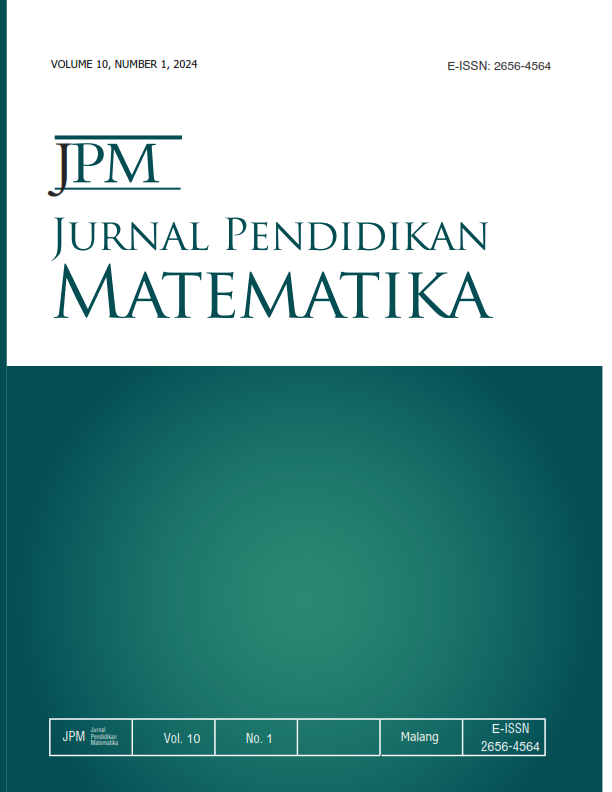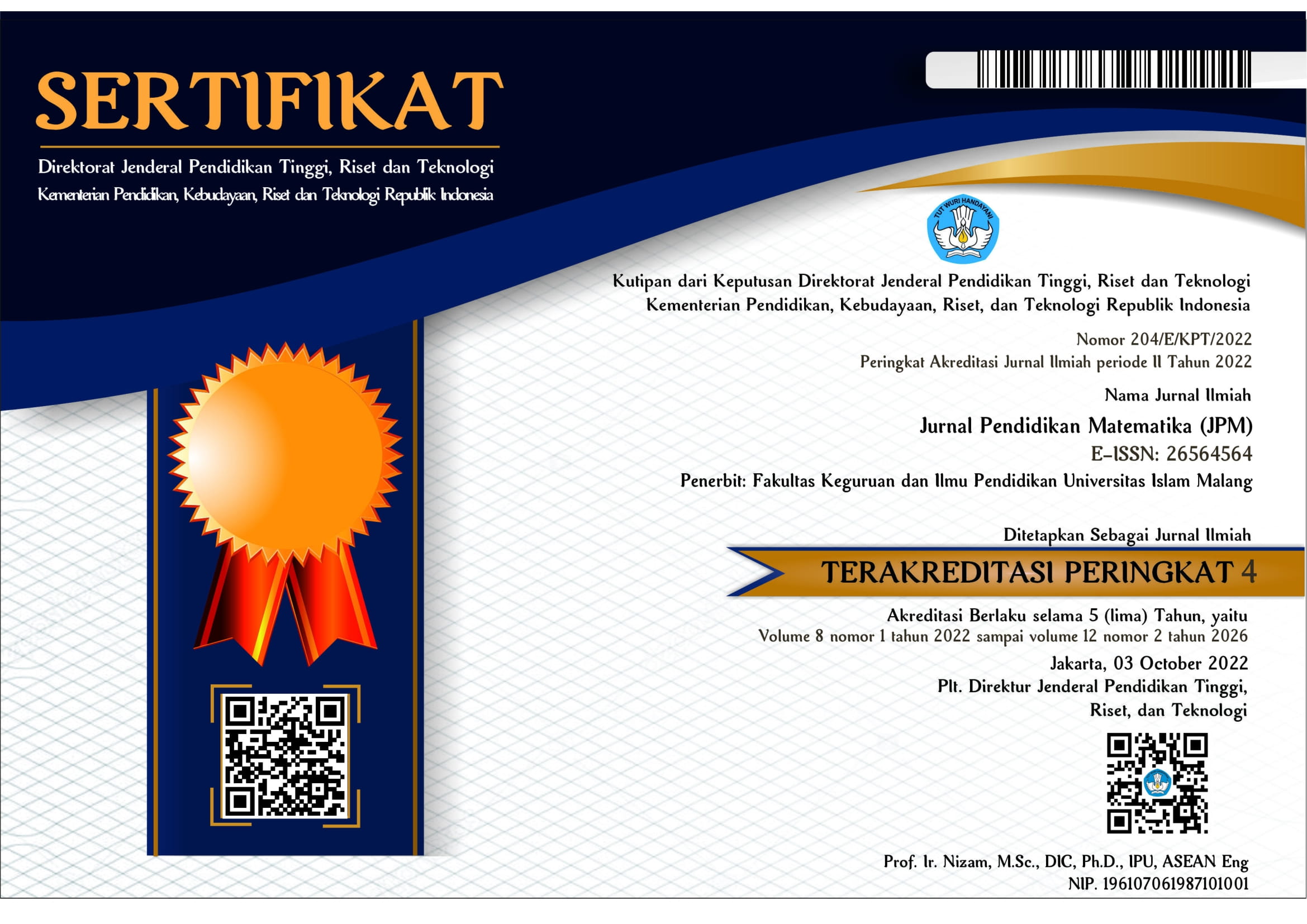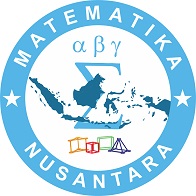An Analysis of Student Learning Barriers for Elementary School Students in Understanding Mathematical Concepts of Fractions
DOI:
https://doi.org/10.33474/jpm.v10i1.21576Keywords:
Learning barriers, Concept Understanding, FractionsAbstract
This study aims to: (1) describe the achievement of indicators for understanding students' mathematical concepts about fractions. (2) Describe the learning barriers that occur in students and the factors that cause them to understand the mathematical concept of fractions. This research is a qualitative descriptive study conducted in class IV MI Darul Muttaqin Sukomangu, with a total of 10 students. All students are given a test to measure the achievement of indicators of understanding the concept. The test results are then grouped into 3 categories, namely high, medium, and low. From each category, interview subjects were selected with the criteria of not achieving some or all of the indicators of understanding the concept and having good communication skills. This interview aims to determine the learning barriers that occur and the factors that cause them. The data analysis technique was carried out in three stages, namely data condensation, data presentation, and conclusion. The test results show that 4 students fall into the category of high concept understanding, 3 students in the medium category, and 3 students in the low category. In the results of the interview, it was found that there were learning barriers, namely ontogeny and epistemological barriers. The most dominant obstacle is the ontogeny barrier with indicators of lack of concentration when learning begins. In addition, the most dominant factor was found, namely internal factors in the form of emotional aspects or wrong attitudes, namely lack of learning.
References
Agustina, A., & Fuadiah, N. F. (2018). Kemampuan Pemahaman Konsep Matematika Siswa Kelas VII Dalam Penerapan Model Penemuan Terbimbing. Jurnal LEMMA, 5(1), 52–60. https://doi.org/10.22202/jl.2018.v5i1.3006
Anggraeni, F. (2016). Analisis Kemampuan Pemahaman Konsep Matematis dan Kemandirian Belajar Siswa. Academia Edu.
Annisah, S., Suhendi, S., A., & Masfi’ah, S. (2021). Analisis Kemampuan Pemahaman Konsep Matematis Siswa Sekolah Dasar Selama Pembelajaran Online di Masa Pandemic Covid-19. Elementary Jurnal Ilmiah Pendidikan Dasar, 5(1), 64. https://doi.org/10.22373/jppm.v5i1.9974
Arikunto, S. (2009). Prosedur Penelitian Suatu Pendekatan dan Praktik (Edisi Revi. PT. Rineka Cipta.
Arikunto, S. (2010). Prosedur Penelitian Suatu Pendekatan dan Praktik. PT. Rineka Cipta.
Astuti, S. P. (2015). Pengaruh Kemampuan Awal dan Minat Belajar terhadap Prestasi Belajar Fisika. Jurnal Formatif, 5(1), 68–75.
Brousseau, G. (2002). Theory of didactical situations in mathematics: Didactique des mathématiques (Vol. 19). Kluwer Academic Publishers.
Budiono, I., & Suhendar, U. (2019). Meningkatkan Pemahaman Konsep Matematika Siswa melalui Pendekatan RME. Seminar Nasional Pendidikan Dan Pembelajaran, 1, 488–495.
Elfiah, N. S., Maharani, H. R., & Aminudin, M. (2020). Hambatan Epistemologi Siswa Dalam Menyelesaikan Masalah Bangun Ruang Sisi Datar. Delta: Jurnal Ilmiah Pendidikan Matematika, 8(1), 11. https://doi.org/10.31941/delta.v8i1.887
Fernandes, L., Appulembang, O. D., & Winardi, Y. (2019). Hambatan Belajar Matematika: Studi Kasus Di Kelas VIII Suatu Sekolah Di Semarang [Barriers To Learning Mathematics: a Case Study of Grade 8 Students At a School in Semarang. JOHME: Journal of Holistic Mathematics Education, 3(1), 16. https://doi.org/10.19166/johme.v3i1.2071
Herini, M., Wahyudi, W., Hidayati, N., Sumarno, S., & Trinuryono, S. (2023). Representasi Kemampuan Pemahaman Konsep Trigonometri Analitik Siswa dengan Pengimplementasian Model Discovery Learning. Jurnal Dimensi Pendidikan Dan Pembelajaran, 11(1), 110–119.
Koswara, U. (2018). Belajar Matematika Menggunakan Software Geogebra Classic Versi 5.0 Dalam Membuat Grafik Pada Materi Fungsi Kuadrat. Jurnal Edukasi Sebelas April, 2(1), 82–89.
Kristanti, F. R., Isnarto, I., & Mulyono, M. (2019). Kemampuan Pemahaman Konsep Matematis Siswa dalam Pembelajaran Flipped Classroom berbantuan Android. Seminar Nasional Pacasarjana.
Kumalasari, M., Sofelma, & Fauzan, A. (2021). Pengaruh Kemampuan Membaca dan Motivasi Belajar Terhadap Pemecahan Soal Matematika di Sekolah Dasar. Jurnal Basicedu, 5(2), 997–1005.
Miles, M. B., Huberman, A. M., & Saldana, J. (2020). Qualitative Data Analysis (4th ed.). SAGE Publications.
Mukminah, H., & Sriyani. (2021). Analisis Kesulitan Belajar Berhitung Siswa pada Mata Pelajaran Matematika Kelas IV SDN 1 Anyar. Jurnal Pacu Pendidikan Dasar Jurnal PGSD UNU NTB, 1(1), 1–14.
Novitasari, D. (2016). Pengaruh Penggunaan Multimedia Interaktif Terhadap Kemampuan Pemahaman Konsep Matematis Siswa. FIBONACCI: Jurnal Pendidikan Matematika Dan Matematika, 2(2), 8. https://doi.org/10.24853/fbc.2.2.8-18
Novrilla, U., Andrizal, & Zulhaini. (2020). Pengaruh Lingkungan Sekolah terhadap Konsentrasi Belajar Peserta Didik di MAS Babusalam Simandolak Kecamatan Benai Kabupaten Kuantan Singingi. JOM FTK UNIKS, 1(2).
Nurhayati, E. (2019). Kajian analisis kesulitan pemahaman konsep matematika bangun datar siswa kelas iv sd negeri podosoko ii sawangan magelang. In Universitas Muhammadiyah Padang. Universitas Muhammadiyah Padang.
Nurhidayah, D. A. (2015). Pengaruh Motivasi Berprestasi dan Gaya Belajar Terhadap Prestasi Belajar Siswa Pada Mata Pelajaran Matematika SMP. Jurnal Dimensi Pendidikan Dan Pembelajaran, 3(2), 13–24. https://doi.org/10.24269/dpp.v3i2.83
Permendikbud, R. I. (2018). Nomor 37 tahun 2018 tentang Perubahan atas Peraturan Menteri Pendidikan dan Kebudayaan Nomor 24 tahun 2016 tentang Kompetensi Inti dan Kompetensi Dasar Pelajaran pada Kurikulum 2013 pada Pendidikan Dasar dan Pendidikan Menengah. JDIH Kemendikbud, 1.
Putri, Y. L., & Rifai, A. (2019). Pengaruh Sikap dan Minat Belajar terhadap Motivasi Belajar Peserta Didik Paket C. Journal of Nonformal Education and Community Empowerment, 3(2), 173–184. https://doi.org/10.15294/pls.v2i1.23448
Radiusman. (2020). Studi literasi: pemahaman konsep siswa pada pembelajaran matematika. FIBONACCI: Jurnal Pendidikan Matematika Dan Matematika, 6(1), 1–8.
Rais, H., & Ferinaldi. (2019). Pengaruh minat belajar terhadap pemahaman konsep matematis pada mata kuliah teori bilangan mahasiswa pendidikan matematika. Mat-Edukasia: Jurnal Pendidikan Matematika, 4(1), 71–77.
Rosyida, E. M., Riyadi, & Mardiyana. (2016). Analisis Kesalahan Siswa dalam Pemecahan Masalah Berdasarkan Pendapat John W. Santrock pada Pokok Bahasan Bangun Ruang Sisi Lengkung Ditinjau dari Gaya Belajar dan Gaya Berpikir Siswa. Jurnal Elektronik Pembelajaran Matematika, 4(10), 52–63.
Setyani, M. R., & Ismah. (2018). Analisis Tingkat Konsentrasi Belajar Siswa Dalam Proses Pembelajaran Matematika Ditinjau Dari Hasil Belajar. Pendidikan Matematika, 01, 73–84.
Siagian, M. D. (2016). Kemampuan koneksi matematik dalam pembelajaran matematika. MES: Journal of Matematics Education and Science2, 2(1), 58–67.
Torbeyns, J., Schneider, M., Xin, Z., & Siegler, R. S. (2015). Bridging the gap: Fraction understanding is central to mathematics achievement in students from three different continents. Learning and Instruction, 37, 5–13. https://doi.org/10.1016/j.learninstruc.2014.03.002
Ulfa, N., Jupri, A., & Turmudi, T. (2021). Analisis Hambatan Belajar Pada Materi Pecahan. Research and Development Journal of Education, 7(2), 226. https://doi.org/10.30998/rdje.v7i2.8509
Unaenah, E. (2017). Analisis Learning Obstacles Konsep Geometri Pada Mahasiswa Semester 1 Program Studi Pendidikan Dosen Sekolah Dasar. In Prosiding Seminar Nasional Pendidikan FKIP UNTIRTA (pp. 289–296).
Utomo, J. S. (2016). Analisis Kemampuan Pemahaman Konsep Matematis Siswa SMP N 3 Kalibogor Berdasarkan Emotional Quotient (EQ. Universitas Muhammadiyah Purwokerto.
Wahyudi, W., Sumaji, S., Rufiana, I. S., Trinuryono, S., Hidayati, N., Herini, M., & Sumarno, S. (2022). Penerapan Model Pembelajaran Discovery Learning Berbantuan Geogebra Untuk Meningkatkan Pemahaman Konsep Program Linear. Jurnal Silogisme Kajian Ilmu Matematika Dan Pembelajarannya, 7(1).
Downloads
Published
How to Cite
Issue
Section
License
Copyright (c) 2024 Meilani Rohmelia Dewi, Jumadi, Wahyudi

This work is licensed under a Creative Commons Attribution 4.0 International License.






_-_Copy.jpg)
.jpg)
.jpg)










